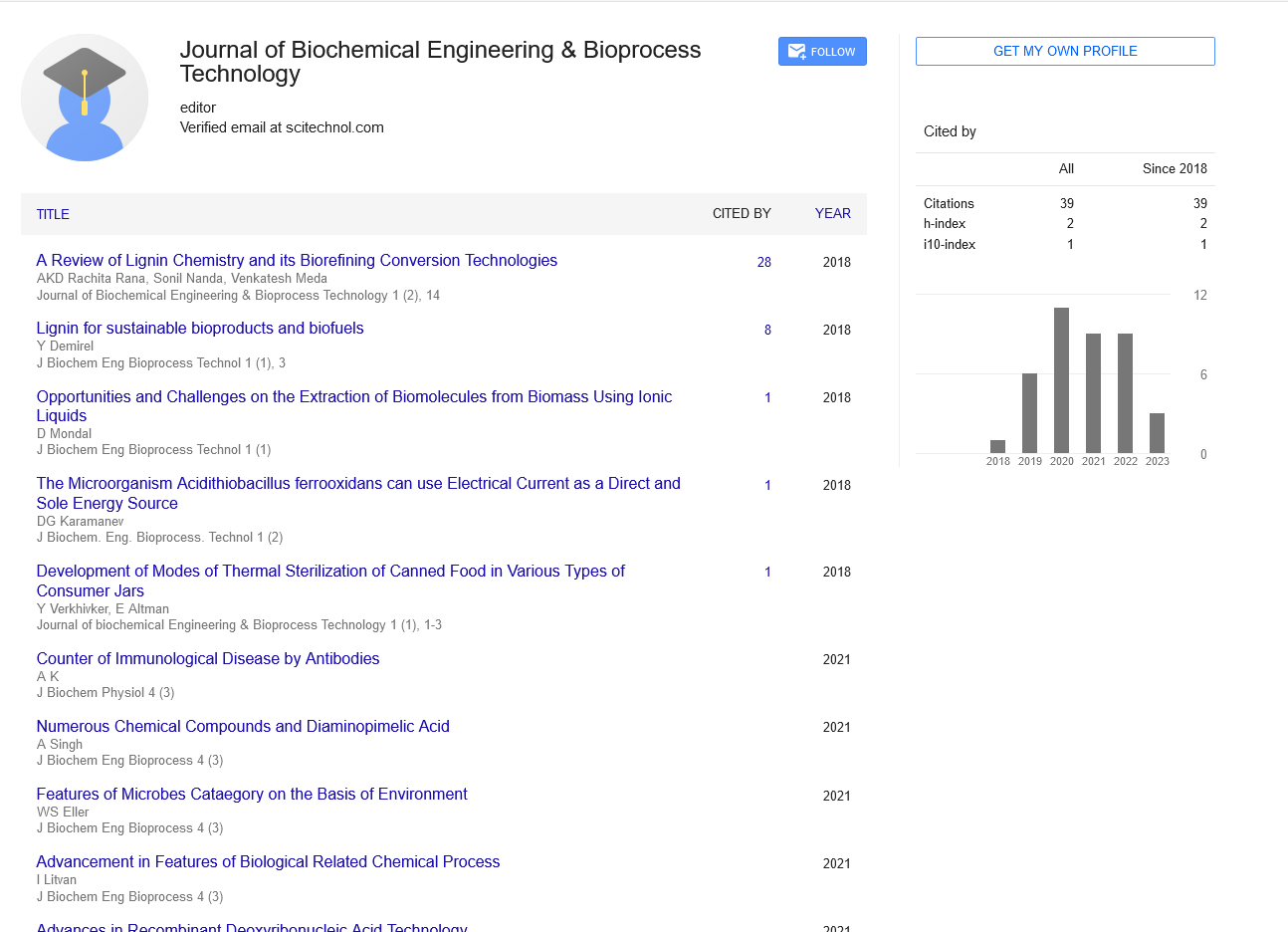Perspective, J Biochem Eng Bioprocess Vol: 6 Issue: 2
Biochemical Engineering for Circular Economy: Biorefineries, Biomass Conversion, and Waste Valorization
Juniper Lyra*
1Department of Biochemical Engineering & Bioprocess Technology, ETH Zurich, Zurich, Switzerland
*Corresponding Author: Juniper Lyra,
Department of Biochemical Engineering, & Bioprocess Technology, ETH Zurich, Zurich, Switzerland
E-mail: lyrajuniper@yahoo.com
Received date: 22 May, 2023, Manuscript No. JBEBT-23-106923;
Editor assigned date: 24 May, 2023, Pre QC. JBEBT-23-106923 (PQ);
Reviewed date: 15 June, 2023, QC No. JBEBT-23-106923;
Revised date: 22 June, 2023, Manuscript No. JBEBT-23-106923 (R);
Published date: 29 June, 2023, DOI: 10.35248/jbebt.1000059.
Citation: Lyra J(2023) Biochemical Engineering for Circular Economy: Biorefineries, Biomass Conversion, and Waste Valorization. J Biochem Eng Bioprocess 7:2.
Keywords: Bioprocess
Description
Biochemical engineering plays an essential role in advancing the concept of a circular economy by enabling the sustainable conversion of biomass and waste into valuable products. This study provides a brief overview of the applications of biochemical engineering in the circular economy, with a focus on biorefineries, biomass conversion, and waste valorization. It explores key strategies employed in biochemical engineering, including enzymatic processes, fermentation, and bioprocess optimization, to transform biomass and waste into biofuels, biochemicals, and other high-value products. Furthermore, the study discusses the potential of biochemical engineering in driving the transition towards a sustainable and resource-efficient circular economy.
Biorefineries: Integrated processing of biomass
Biorefineries are key components of the circular economy, where biomass is processed to obtain multiple valuable products. This section explores the role of biochemical engineering in biorefineries, including biomass pre-treatment, enzymatic hydrolysis, and fermentation. It discusses the integration of different unit operations to maximize resource utilization and product diversification. Additionally, it highlights the importance of process optimization and scale-up for the efficient operation of biorefineries.
Biomass conversion: From renewable feedstocks to biobased products
Biomass conversion involves the transformation of renewable feedstocks, such as agricultural residues, forest biomass, and energy crops, into bio-based products. This section discusses the strategies employed in biomass conversion, including thermochemical and biochemical processes. It explores enzymatic processes for the conversion of cellulose and lignocellulosic biomass into sugars, as well as fermentation for the production of biofuels and biochemicals.
Additionally, it highlights the potential of microbial systems engineering and synthetic biology for enhancing biomass conversion efficiency.
Waste valorization: Transforming waste into resources
Waste valorization involves the conversion of waste materials into valuable products, reducing environmental impact and promoting resource efficiency. This section explores the role of biochemical engineering in waste valorization, including the use of enzymatic processes and fermentation to transform waste streams into biofuels, biopolymers, and specialty chemicals. It discusses the importance of waste characterization, process optimization, and waste stream integration for efficient valorization. Furthermore, it highlights the potential of microbial consortia and bioaugmentation for the treatment and valorization of complex waste streams.
Bioprocess optimization: Maximizing efficiency and sustainability
Bioprocess optimization is essential for achieving efficiency and sustainability in biochemical engineering applications. This section discusses the strategies employed in bioprocess optimization, including process modeling, metabolic engineering, and process integration. It explores the use of advanced tools such as high-throughput screening, omics technologies, and machine learning for process optimization and control. Additionally, it emphasizes the importance of considering environmental factors, energy efficiency, and life cycle assessment in bioprocess design and operation.
Challenges and future perspectives
While biochemical engineering offers promising solutions for the circular economy, several challenges need to be addressed. This section discusses the limitations, including the availability and cost of feedstocks, process scalability, and techno-economic feasibility. It highlights the importance of policy support, public awareness, and collaboration between industry and academia in driving the adoption of biochemical engineering solutions. Furthermore, it explores future perspectives, such as the integration of emerging technologies (e.g., synthetic biology, nanotechnology) and the utilization of nonconventional feedstocks (e.g., waste plastics, carbon dioxide) for sustainable biochemical engineering applications.
Conclusion
Biochemical engineering plays an essential role in advancing the circular economy by enabling the conversion of biomass and waste into valuable products. Biorefineries, biomass conversion, and waste valorization are key areas where biochemical engineering contributes to resource efficiency and sustainability. By employing enzymatic processes, fermentation, and bioprocess optimization, biochemical engineering transforms biomass and waste into biofuels, biochemicals, and other high-value products. Overcoming challenges and continued research and development in this field are essential for the successful implementation of biochemical engineering solutions and driving the transition towards a sustainable circular economy.
 Spanish
Spanish  Chinese
Chinese  Russian
Russian  German
German  French
French  Japanese
Japanese  Portuguese
Portuguese  Hindi
Hindi 